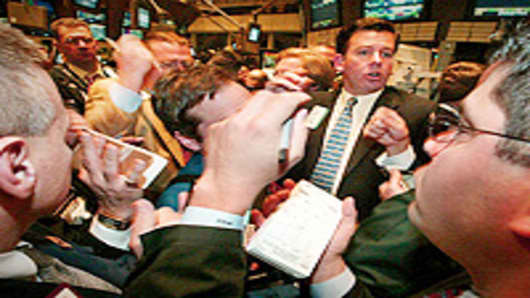The notion that January sets the investing tone for the year has been a less-than-reliable tool lately, something to keep in mind as the market prepares to break another psychological barrier.
There are twin theories about the first month of the year: The notion that "as goes January so goes the rest of the year," as well as the January Effect, which says that late-year selling usually begets early-year buying.
Both have been missing the past two years in the stock market, with each producing a negative first month that preceded strong gains through the full year.
So while this January has produced solid moves higher for the major averages, market pros are advising caution in using that as a barometer for what the market will for the year.
"January returns may make a lot of noise but are unlikely to tell us much about how the year is likely to unfold," David Woo, forex and rates strategist for Bank of America Merrill Lynch, said in a note to clients. "Also, investors should be suspicious of what makes money in January and lock in profits before trends start to falter."
Temptation to jump in because of the January Effect could be compounded as the Dow Jones industrial average flirts with 12,000 and the Standard & Poor's 500 approaches 1,300. The Dow was up 3.5 percent for the year heading into Tuesday's trading, while the S&P had gained 2.6 percent. (The tech-heavy Nasdaq trailed with a 1.5 percent increase.)
Both the Dow and S&P marks hold little significance in terms of technical support or resistance levels in the current market, but they do make attractive headline numbers that could tempt investors to come off the sidelines.
That, too, could be a mistake, particularly as the market by some measures is well into overbought status and overdue for at least a modest pullback.
Domestic equity mutual funds showed inflows of $3.76 billion for the week ended Jan. 12, according to the Investment Company Institute, indicating that retail investors were re-entering the market.
"Most won't invest just because the Dow is approaching the 12,000 mark. I hope anybody investing in the market and not using a financial advisor is looking at price compared to expected earnings," said Beth Larson, principal at Evermay Wealth Management in Washington, D.C. "I would hope that not too many individual investors are getting in at this level."
When the market last crossed 12,000, it was March 2008 and the market was on a fast track lower as the financial crisis was unfolding.
Crossing psychological barriers hasn't always been an accurate way to judge market movements. When the market recovered and shot past 10,000 again in November 2009, it was a quick but bumpy ride up to 11,000 in April 2010. But the market swooned from there before rebounding after the Federal Reserve launched the second leg of its monetary easing program, and voters changed the complexion in Washington by restoring a Republican majority in the House.
Should the news cycle turn negative, as it did after Dow 11,000, investors could be in for some significant volatility.
"If our sense of reading the market tea leaves is remotely accurate, it may be necessary for some action on long-term deficit reduction that is credible to the investment community for a new secular bull market to evolve," Tobias Levkovich, Citigroup's chief market strategist, said in a note to clients.
The touchy political climatehas some investors concerned, regardless of whether the January Effect, which prior to the past two years had correctly predicted the market about 90 percent of the time, proves accurate.
"Everybody seems to be of the same mind now. It's hard to find someone who is not at least moderately bullish. You get everybody lined up on one side of the market and it has a habit of doing the opposite," says David Twibell, president of wealth management for Colorado Capital Bank in Denver. "We are being selective here. The market has had a wonderful run. It may continue but at some point we're going to have a correction."
Twibell is buying stocks that have not participated in the rally, such as Hewlett-Packard , Intel and Cisco.
At Bank of America, Woo is advising clients to hedge positions in foreign currencies such as the Swedish krona and the Korean won as a brace should the "long equities" trade start to become too crowded and falter.
Keith Springer, president of Springer Advisory Services in Sacramento, Calif., said that should the January Effect hold, it's likely that small- and mid-caps will benefit, even after a banner year in 2010.
"That's the sweet spot for this market," Springer said. "Those companies tend to benefit the most from growth."
However, he also thinks that while the market is likely to continue to grow for the first half of the year, the ending of Fed intervention and the realization from investors that real economic recovery is a long way off will hammer stocks, with up to a 50 percent drop possible.
"At some point the rug is going to get pulled out from under you and there's going to be no place to hide," he said. "Whoever is holding the bag at the end is going to get crushed."




